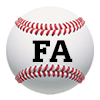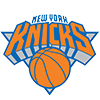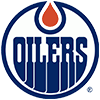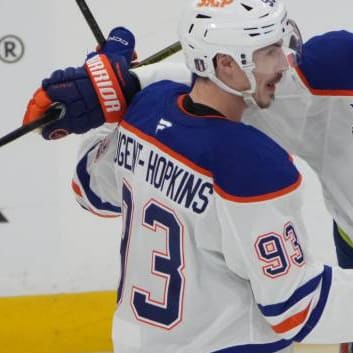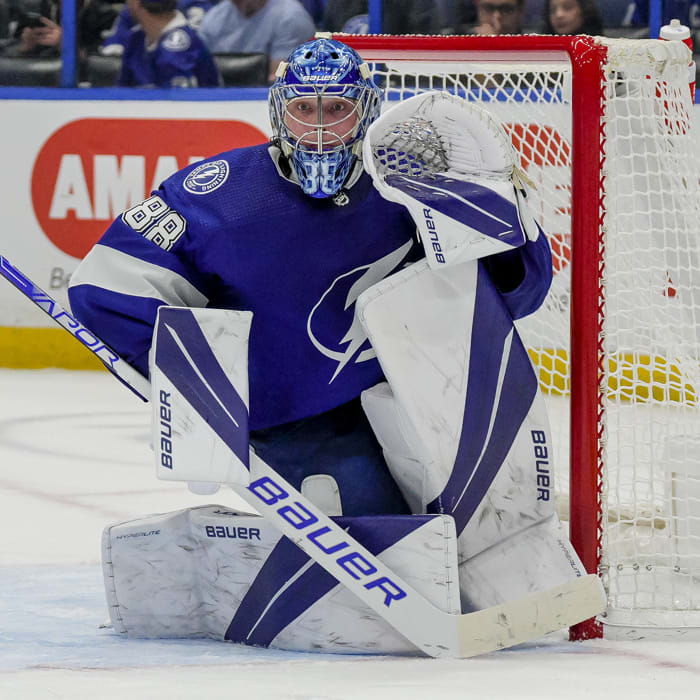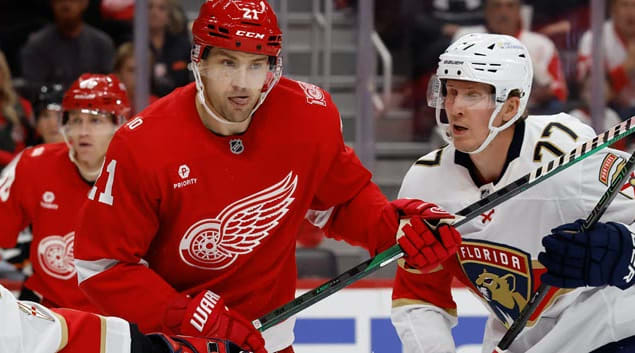Simply put, the 2023 NHL Draft is loaded with high-end talent. There's upwards of a half dozen players that would have ranked atop my big board had they been eligible a year ago. We all know what the Blackhawks will be doing at No. 1 overall, but things get murky thereafter. Our annual rankings of the top 64 prospects are below...
(Note: This is not a mock draft and does not take any team needs into account)
The BEDARD Tier
1. Connor Bedard (C, Regina-WHL): Surprised? Bedard is one of the best overall prospects I have evaluated since I began working for RotoWire in 2003. Literally the only knock on his game is that he's undersized at about 5-foot-10 and 185 pounds. Of course, when you're so good at everything else, that doesn't matter a whole lot. Bedard is an excellent skater -- he's capable of picking up the puck in his own zone and dashing around numerous defenders. His vision is exceptional, and he has one of the best shots I've ever seen for a player his age. His performance at the World Juniors was legendary and he has the skill/work ethic combination to make every other player on the ice better. He's going to be one of the most effective power-play options in the league from the very start and is a threat for 70-plus points in his rookie season. As I mentioned earlier, the next handful players on this list would be worthy of the No. 1
Simply put, the 2023 NHL Draft is loaded with high-end talent. There's upwards of a half dozen players that would have ranked atop my big board had they been eligible a year ago. We all know what the Blackhawks will be doing at No. 1 overall, but things get murky thereafter. Our annual rankings of the top 64 prospects are below...
(Note: This is not a mock draft and does not take any team needs into account)
The BEDARD Tier
1. Connor Bedard (C, Regina-WHL): Surprised? Bedard is one of the best overall prospects I have evaluated since I began working for RotoWire in 2003. Literally the only knock on his game is that he's undersized at about 5-foot-10 and 185 pounds. Of course, when you're so good at everything else, that doesn't matter a whole lot. Bedard is an excellent skater -- he's capable of picking up the puck in his own zone and dashing around numerous defenders. His vision is exceptional, and he has one of the best shots I've ever seen for a player his age. His performance at the World Juniors was legendary and he has the skill/work ethic combination to make every other player on the ice better. He's going to be one of the most effective power-play options in the league from the very start and is a threat for 70-plus points in his rookie season. As I mentioned earlier, the next handful players on this list would be worthy of the No. 1 overall selection in a normal year, but this isn't a normal year. Bedard is that good.
Tier 1A
2. Matvei Michkov (RW, HK Sochi-KHL): Michkov has been on the map as a top prospect for years, but that doesn't mean he hasn't been a difficult evaluation. He belongs to the loaded SKA St. Petersburg KHL organization in his native Russia, but there wasn't room for him to get consistent ice time there last season, so they loaned him to Sochi. Michkov also didn't get a chance to perform on the international stage with Russia being banned from the World Juniors. Michkov's hockey sense is remarkable for such a young player. He is seemingly always in the correct spot and always knows how to go about attacking opposing defenders. I'd term him more of a finisher than a playmaker, but he possesses a well above average all-around offensive game. He's the best Russian prospect since Alex Ovechkin and Evgeni Malkin went 1-2 in 2004. The earliest Michkov can reportedly come to the NHL is the fall of 2026. That could impact his draft stock, as could everything going on with Russia on the world stage right now. This ranking is purely based upon his on-ice abilities. It's not out of the realm of possibility that he could slide out of the top five on draft day, but I think his absolute floor is Washington at No. 8 overall.
3. Adam Fantilli (C, University of Michigan-NCAA): The lone collegiate player on the Canadian World Junior team which won the Gold Medal this past January, Fantilli was inconsistent during the tournament and still finished with five points in seven games. His freshman season at Michigan was anything but inconsistent. He finished the year with 30 goals and 65 points in 36 games, one of the best NCAA debuts in recent memory and more than enough to take home the Hobey Baker Award as college hockey's best player. Fantilli is strong enough to plow through opposing defenders and talented enough to dance around them. He has an excellent shot and the size (6-foot-2, 200 pounds) to consistently win board battles. 18-years-olds that bring this type of offensive package to the table are nearly impossible to find. Fantilli's natural abilities will carry him as he develops early in his professional career. The long-term ceiling is exceptionally high here.
TIER 1B
4. Leo Carlsson (C/LW, Orebro-SHL): Playing in one of the best non-NHL leagues in the world, Carlsson was a consistent contributor for the SHL's Orebro (10G, 25P in 44GP) despite the fact he turned just 18 years of age the day after Christmas. He was good, if not dominant, for Sweden (6P in 7GP) at the World Juniors and finished the year with a strong showing (5P in 8GP) at the men's World Championship. The three players ahead of Carlsson on this list bring more traditional "star power" to the table. Leo is more the sum of his parts. That said, Carlsson has excellent hands and is very good at making plays in tight spaces. He's difficult to knock off the puck at 6-foot-3 and nearly 200 pounds. Some scouts have debated Carlsson's foot speed. He'll never be mistaken for Connor McDavid, but I would term it about average and combined with his constant work ethic, I doubt it will hold him back. Carlsson can play both center and wing, although I imagine the team that drafts him will start him in the middle and go from there. I personally don't have a huge preference either way.
5. Will Smith (C, US NTDP-USHL): Smith is the best prospect this year from the US NTDP, a program that has crafted countless high-end draft picks over the years. A no-doubt center with no significant warts in his game, Smith is the type of player that can seem quiet at times and then you look up and he has two points every single night. He's comfortable hanging onto the puck to make plays in the offensive zone and he's more than capable of finishing whatever looks at the net he may have. Smith has the smarts to play up and down a lineup in addition to having top-six offensive abilities. He's a high-floor prospect with a legitimately high ceiling. Smith, a native of Lexington, Massachusetts, is off to Boston College in the fall.
TIER 2
6. Zach Benson (LW, Winnipeg-WHL): Seemingly consistently a step ahead of everyone else on the ice, Benson was a top player all year long for arguably the best team in the WHL. After posting 25 goals and 63 points in 58 games in his first full junior campaign in 2021-22, Benson upped those totals to 36 goals and 98 points in 60 games this past year. Benson's hockey sense is exceptional, and although he doesn't possess breakaway speed, as many talented players do, he seems to move better with the puck than without it. My lone concern is the fact Benson is 5-foot-10 and about 160 pounds. He works his tail off and is constantly hounding opposing defenders whenever the opportunity presents itself, but you would ideally like to see such an undersized player skate a bit better than Benson does. Other than that, Benson projects as a no-doubt top-six forward that should be able to carve up opposing penalty killers with his vision and patience.
7. Oliver Moore (C, US NTDP-USHL): Moore has played himself into the late lottery, if not higher, following an excellent season with the US NTDP. He's a brilliant skater with the ability to weave in and out of traffic. Moore has a good shot and is willing to go to the difficult areas of the ice to make a play. Simply put, there's no real holes in his game. Moore's somewhat undersized at 5-foot-11, 180 pounds, but his compete level is strong and he's responsible defensively. Moore has a real chance to be a middle-six NHL regular without a ton of improvements to his game. If those improvements come, he has star potential. He's committed to the University of Minnesota.
8. David Reinbacher (D, Kloten-Switzerland): One of Reinbacher's greatest selling points is how much high-level hockey he has played at such a young age. He was one of the top defenders for Kloten in the Swiss league this past season as an 18-year-old. Reinbacher also (and unsurprisingly) was Austria's most noticeable player at the 2023 World Juniors. Reinbacher has it all. He's a big (6-foot-2, 185 pounds), physical kid with solid mobility. He makes smart plays with the puck, even if he doesn't project as a power-play quarterback at the NHL level. It's difficult to see Reinbacher evolving into anything less than a middle-pairing defender with the ability to impact a game in all three zones given how much he brings to the table and how much we have seen from him so far.
9. Ryan Leonard (RW, US NTDP-USHL): I would be surprised, bordering on shocked, if Leonard doesn't become a useful NHL player in some capacity. He makes life miserable for opposing defenders and is relentless in his pursuit of the puck. He's not particularly creative in the offensive zone, but he can put the puck in the back of the net and has displayed the speed and smarts to fit in nicely alongside talented offensive players. Leonard's older brother, John, spent some time with the Sharks over the past few seasons. It's more floor than ceiling, but Ryan Leonard projects as a rock-solid, mid-first rounder on draft day. Like his brother, Ryan is committed to the University of Massachusetts.
10. Dalibor Dvorsky (C, AIK-Sweden Jr.): A native of Slovakia, Dvorsky has spent the past several years playing in Sweden. He spent this past season with AIK in Sweden's second tier Allsvenskan and was up and down in terms of performance (14P in 38GP). If you catch him at his best, Dvorsky will look like a clear-cut future top-six forward. He's always been an excellent playmaker and I've always found his shot to be underrated. There are consistency issues to work through here and Dvorsky's skating isn't great, so the team that drafts him will be hoping his smarts and skills can make up for that. There's also a chance Dvorsky, one of the draft's younger players with a mid-June birthday, may be forced to the wing because he can't keep up with the pace required for playing the middle. He's an excellent prospect, but there's enough concern for me to slide him down the list just a bit.
TIER 3
11. Gabe Perreault (RW, US NTDP-USHL): The son of former NHL center Yanic Perreault and brother of Anaheim prospect Jacob, Gabe was one of the US NTDP's best players this past season. All competitions combined, he finished with 155 points in 78 games. Perreault is one of the most creative playmakers in this draft, particularly in tight spaces. His vision is exceptional, as is his ability to carve up opposing defenders with the man advantage. The main concern regarding Perreault is his lack of breakaway speed combined with his average size at 5-foot-11 and about 170 pounds, although I've always found he moves better with the puck than without, a necessary trait for all good offensive players. Ultimately, I'm willing to bet on his smarts, work ethic, and easy top-six skill level in the late lottery.
12. Matthew Wood (RW, University of Connecticut-NCAA): Wood led the BCHL in goals (45) and points (85 in 46 games) two years ago. He took a regular shift for UConn this past season and averaged nearly a point-per-game (11G, 34P in 35GP) despite the fact he was the youngest player in college hockey, turning 18 years of age in early February. He is an excellent option with the man advantage and shoots it well enough to beat goalies consistently from distance. That's all the good news. The bad news is that Wood is a poor skater and his game lacks pace. That typically gets magnified the more you move up the ladder. And while I wouldn't say he shies away from contact, Wood's game lacks physicality despite being 6-foot-3 and upwards of 200 pounds. Wood's offensive production relative to his age and the level at which he played in 2022-23 was highly impressive, but there's legitimate concern his skill set won't translate particularly well to the professional ranks.
13. Nate Danielson (C, Brandon-WHL): Danielson was the captain and leading scorer (33 goals, 78 points in 68 games) for a mediocre Wheat Kings team which failed to make the WHL postseason in 2022-23. The offensive numbers may seem underwhelming for a perceived "top prospect", but it's easy to imagine him blowing past the 100-point mark if flanked by a better supporting cast. Danielson has no real holes in his game. He's a true center with solid foot speed and an excellent mix of size (6-foot-2) and skill in his game. You can squint hard and find a scenario in which Danielson develops into a legitimate top-line NHL center, although a respectable No. 2 pivot is a more likely scenario.
14. Brayden Yager (C, Moose Jaw-WHL): The 2021-22 CHL Rookie of the Year, Yager -- who has been on the map as a top prospect for a while -- had a somewhat underwhelming season (28G, 78P in 67GP) in 2022-23 given what was expected of him. Yager has a bomb of a shot and has consistently displayed the ability to score both off the rush and off set pieces in the offensive zone. His passing is often underrated because of how well he shoots it, but Yager is a complete all-around offensive player. There isn't much here in terms of size (6-foot, 170 pounds), but the smarts and effort level Yager possesses should allow him to remain in the middle moving forward, something that will serve to boost his stock on draft day.
15. Quentin Musty (LW, Sudbury-OHL): A native of Hamburg, New York, just outside of Buffalo, Musty was the No. 1 overall selection in the 2021 OHL Draft. He had a good season for the Wolves (26G, 76P in 53GP) in 2022-23 and is one of the draft's younger players, as he won't turn 18 years of age until July 6. Musty looks the part of a future top-six forward. He's big (6-foot-2, 205 pounds) with very quick hands and the ability to make creative plays in the offensive zone. If everything comes together, Musty could be a star. If not, I'm worried about his ability to impact a game. Musty doesn't project as a bottom-six grinder, so he's going to have to put up points to justify his likely mid-first-round selection
16. Colby Barlow (LW, Owen Sound-OHL): Barlow has multiple NHL-caliber traits, although I'm a bit torn regarding what type of player he will become at the NHL level. He's been a big-time goal scorer in junior, lighting the lamp 76 times in 118 games with OHL Owen Sound, including 46 this past season. He has a massive shot with the ability to beat opposing goaltenders clean from distance, but his playmaking skills are lacking, and I could absolutely see a scenario in which he's best served as a third-liner and penalty-killer that can chip in some secondary offense for a club as opposed to being a main generator. Barlow's floor is high because he's plenty strong enough to win board battles and finish whatever chances are presented to him from his linemates.
17, Mikhail Gulyayev (D, Omsk-Russia): This one will be fascinating. Based on pure ability, Gulyayev should be in the mix to be the first defenseman selected. For starters, he's a brilliant skater, one of the few in this draft with the ability to pull away from opposing forwards. Gulyayev is also smart and creative enough to be a legitimate power-play QB1 at the NHL level. He played KHL games this past season as a 16-year-old and struggled defensively in his brief 13-game cameo, but that can be chalked up to youth. There's enough here in terms of speed and hockey IQ to believe Gulyayev will eventually be able to defend at an average level. If that is indeed the case, his offensive abilities will carry him the rest of the way. The main question at this point is how early a club will be willing to roll the dice given the fact Gulyayev hasn't made it clear when he plans to come to North America.
18. Eduard Sale (W, Brno-Czechia): Sale destroyed the Czechia junior league two seasons ago to the tune of 42 goals and 89 points in 39 games. He was less effective this past year (7G, 14 P in 43GP) for Brno in that country's top Extraliga, but he's consistently produced in international competitions and has widely been viewed as a top prospect in this class for a while now. More quick than fast, Sale, a left-handed shot, seems best suited to play the right side long term. His playmaking is ahead of his finishing at this point. Sale is a constant threat with the man advantage, as he finds seams in the defense lots of players would overlook. Combine all that with the fact he has good size (6-foot-1, 175 pounds), skates fine, and turned just 18 years of age in late March, and you have an asset on your hands
19. Samuel Honzek (LW, Vancouver-WHL): A leg injury suffered at the World Juniors cost Honzek the better part of two months. He still averaged well over a point-per-game (23 goals, 56 points in 43 games) for the WHL's Vancouver Giants in addition to showing a wide array of secondary skills. Honzek moves well for a kid that checks in at 6-foot-4. He might be best served as a third-liner that can contribute 15-20 goals a season to an NHL club, but I wouldn't rule out Honzek developing into a top-four winger given his hockey sense and work ethic. He has the look of a competent two-way pro with a high floor.
TIER 4
20. Axel Sandin Pellikka (D, Skelleftea-SHL): A fringe first-rounder when the season began, Sandin Pellikka has played his way into the late lottery discussion, even if I have him ranked a tad lower than that. He put up absurd numbers for Skelleftea's Jr. team (16 goals, 36 points in 31 games) and was stellar for Sweden's World Junior team last year despite managing just a single assist in seven games. Sandin Pellikka is a modern-day offensive defenseman. He wins with vision and smarts instead of speed and physicality. Sandin Pellikka may never be the type to log heavy defensive minutes, but I have zero issues with how hard he works in his own zone and that, combined with his other offensive abilities, should help him take a regular shift at the NHL level in addition to being a threat with the man advantage.
21. Daniil But (LW, Yaroslavl-Russia): 6-foot-5, 18-year-olds with good hands and a heavy shot don't grow on trees, so it's not the least bit surprising But figures to be in high demand come draft night. He averaged a point-per-game in Russia's Jr. league this past season (15 goals, 26 points in 26 games) before barely playing in his 15-game stint (2 goals) with Yaroslavl's KHL club. But he has the frame to consistently win board battles in the offensive zone, and his defensive play, while far from elite, is quite reasonable. But's foot speed is lacking, and he may struggle to generate offense off the rush, but he's a real threat off the cycle and with the man advantage. You can squint and see a guy with a massive ceiling if his skating improves just a bit.
22. Calum Ritchie (C, Oshawa-OHL): The No. 2 overall pick in the 2021 OHL Draft, Ritchie was good, but not great (24G, 59P in 59GP) in his second season with the Generals. Now, it should be mentioned he was playing for one of the OHL's weaker teams. His so-so season aside, it's easy to see why multiple NHL teams will be fascinated with Ritchie come draft day. He's 6-foot-2 and should be pushing 200 pounds when all is said and done. He has excellent hands and the ability to beat opposing defender's one-on-one. He's also going to remain in the middle. If you think Ritchie's failure to consistently impact the game this season was simply the result of the lack of talent around him, then he's an ideal "buy low" guy. However, I'd still be surprised if he made it to the 20's on draft day. There's just too much to like here.
23. Tom Willander (D, Rogle-SHL): A fringe first-rounder when the year began, Willander would appear to be a lock to be selected in the top 32 picks at this point, with a non-zero chance he could find himself selected in the latter stages of the lottery. Willander is an exceptional skater. He's one of very few defenders in the draft with the ability to outrace opposing forwards on a consistent basis. His offensive game is quite basic, but he is by no means a butcher with the puck on his stick. Toss in the fact he battles hard in his own zone and Willander doesn't have far to go to be a serviceable NHL player. He's committed to Boston University.
24. Riley Heidt (C, Prince George-WHL): The former No. 2 overall pick in the 2020 WHL Bantam Draft, Heidt has been on the prospect map for a while. He put up big offensive numbers for the WHL's Prince George Cougars this past season, finishing with 25 goals and 97 points in 68 games, tying him for fourth in WHL scoring. Heidt is particularly dangerous off the rush, possessing the speed and acceleration to fly through the neutral zone and around opposing defenders. Heidt reads plays well and seems to be constantly involved, making plays in all three zones. I'm not sure if his upside is super high, but he has all the qualities to be a competent pro.
25. Andrew Cristall (LW, Kelowna-WHL): Opinions on Cristall are all over the map. He finished this past season tied for sixth in WHL scoring (39 goals, 95 points in 54 games) and he would have been a whole lot higher had he not missed some time due to injury. What's not in dispute is Cristall's skill and creativity. He is talented enough to beat opposing defenders one-on-one and possesses the ability to make the most difficult offensive plays seem routine. Cristall's skating is the real issue. He lacks burst and his overall skating stride has many concerned. Simply put, there aren't many NHL players that look like Cristall. With Bedard obviously playing in the NHL next season, I could easily see a scenario in which Cristall leads the WHL in scoring. That, of course, doesn't mean he will be a good pro. I'd be terrified to take Cristall in the lottery, but anywhere from 20 onward seems like a worthy risk.
26. Gavin Brindley (RW, University of Michigan-NCAA): Brindley's freshman season at Michigan went about as well as anyone could have hoped. He averaged nearly a point-per-game (12 goals, 38 points in 41 games) in helping the Wolverines reach the Frozen Four, in addition to playing his way onto the United States World Junior team which won the Bronze Medal. Brindley has two well above-average tools in his speed and compete level. He lacks ideal top-six skill, but he constantly seems to be in the right place in the offensive zone, which helps increase his production. Betting on a 5-foot-9, 165-pound forward without high-end skill is risky, but Brindley offers enough elsewhere to provide a solid floor as a professional, at a minimum.
27. Dmitri Simashev (D, Yaroslavl-Russia): You must dig deeper than the stat line to accurately gauge Simashev's future potential. He posted just a dozen points in 51 games combined for Yaroslavl's KHL and Jr. club. Simashev is a big kid (6-foot-4, 200 pounds) that skates well. His gap control is excellent, and he constantly retrieves pucks and moves them up and out of the defensive zone without issue. While I don't think he will ever be a major point producer at the NHL level, I imagine there's a bit more offense to his game than we have seen thus far. Simashev could play in the NHL with just minor improvements to his game, with his ceiling being much higher as he grows into his body and gains further experience. If you believe the offense will come, he's a mid first-rounder.
TIER 5
28. Bradly Nadeau (RW, Penticton-BCHL): Nadeau led the BCHL in goals (45), assists (68) and points (113 in 54 games) this past season, while also being named the league's regular season and playoff MVP. It's worth mentioning that Penticton's regular season record was 50-3-1. They scored 304 goals and gave up just 96. That said, there's plenty to like about Nadeau's game. He can really skate and excels at making plays at high speed. His shot is excellent and he's deadly in open space. I don't love the fact Nadeau is heading to a University of Maine program that has produced very few talented NHL forwards in recent years, but his individual skill set makes him a fringe first-rounder, even in a loaded draft year.
29. Otto Stenberg (C, Frolunda-SHL): Stenberg spent a good chunk of the 2022-23 season playing for Frolunda's SHL club as a 17-year-old, finishing with a goal and three points in 23 games. He was predictably the organization's junior club, posting 26 points in 29 games. Stenberg has the look of a useful utility player once he arrives in North America. He can play both center and wing and has no significant holes in his game. Stenberg's compete level is strong, and he should be a useful source of secondary offense. Stenberg projects as a strong two-way third-liner with a small chance for more if everything comes together.
30. Lukas Dragicevic (D, Tri-City-WHL): My favorite attribute to bet on for defensive prospects is hockey sense, and that is by far Dragicevic's greatest strength. His high-level vision and ability to run a power play allowed Dragicevic to finish fourth among all WHL defenders in scoring (75 points in 68 games) despite owning a well below-average set of wheels. There are concerns regarding Dragicevic's ability to keep up with the pace of play as he moves up the ladder, so there's major risk here despite all he brings to the table. I'd wager he is smart enough to figure it out over time, with his floor being a power-play specialist who needs to play sheltered minutes at even strength.
31. Charlie Stramel (C, University of Wisconsin-NCAA): Playing the entire 2022-23 season at age 18, Stramel took a regular shift for the Badgers. He didn't produce much offensively (5G, 12P in 33GP), although he looked a bit better at times (3 assists in 7 games) in a pure depth role for Team USA at the World Juniors. Stramel is a hulking kid (6-foot-3, 215 pounds) who can move. He SHOULD impact a game more than he does given his size and skating ability. He can finish plays around the net and his compete level is fine, but Stramel's game lacks creativity and it's fair to wonder if he will ever be able to put it all together to the point he can fill a middle-six role at the NHL level. As is, Stramel should be viewed as a depth prospect with some theoretical long-term upside.
32. Ethan Gauthier (RW, Sherbrooke-QMJHL): Gauthier's father, Denis, played more than 500 NHL games, mostly with the Flames in the early 2000's. Although Denis was a defenseman and Ethan is a winger, they share similar traits. Gauthier's compete level is exceptional and he's more than willing to go to the difficult areas of the ice to make a play. You get the same effort from him each night, and while he's unlikely to be a driver of offense at the NHL level, he's talented enough to finish whatever scoring chances are presented to him. I think he projects as more of a bottom-six forward than a top-six guy, which is why I have him ranked as a late first-rounder. I could see him going earlier if some team falls in love with the all-around package.
THE NEXT 32
33. David Edstrom (C, Frolunda-SHL)
34. Oliver Bonk (D, London-OHL)
35. Tanner Molendyk (D, Saskatoon-WHL)
36. Michael Hrabal (G, Omaha-USHL)
37. Danny Nelson (C, US NTDP-USHL)
38. Oscar Fisker Molgaard (C, HV71-SHL)
39. Jayden Perron (RW, Chicago-USHL)
40. Etienne Morin (D, Moncton-QMJHL)
41. Lenni Hameenaho (RW, Assat-Liiga)
42. Adam Gajan (G, Green Bay-USHL)
43. Kasper Halttunen (RW, HIFK-Liiga)
44. Theo Lindstein (D, Brynas-SHL)
45. Trey Augustine (G, UD NTDP-USHL)
46. Anton Wahlberg (C, Malmo-SHL)
47. Luca Cagnoni (D, Portland-WHL
48. Hunter Brzustewicz (D, Kitchener-OHL)
49. Mathieu Cataford (RW, Halifax-QMJHL)
50. Roman Kantserov (RW, Magnitogorsk-Russia)
51. Carson Rehkopf (LW, Kitchener-OHL)
52. Beau Akey (D, Barrie-OHL)
53. Alex Ciernik (LW, Sodertalje-Sweden)
54. Koehn Ziemmer (RW, Prince George-WHL)
55. Maxim Strbak (D, Sioux Falls-USHL)
56. Luca Pinelli (C, Ottawa-OHL)
57. Kalan Lind (LW, Red Deer-WHL)
58. William Whitelaw (LW, Youngstown-USHL)
59. Cam Allen (D, Guelph-OHL)
60. Aydar Suniev (LW, Penticton-BCHL)
61. Caden Price (D, Kelowna-WHL)
62. Jakub Dvorak (D, Liberec-Czechia)
63. Gracyn Sawchyn (C, Seattle-WHL)
64. Jesse Kiiskinen (RW, Pelicans-Liiga)
JUST MISSED
- Nick Lardis (LW, Hamilton-OHL)
- Carson Bjarnason (G, Brandon-WHL)
- Andrew Strathmann (D, Youngstown-USHL)
- Aram Minnetian (D, US NTDP-USHL)
- Denver Barkey (C, London-OHL)











